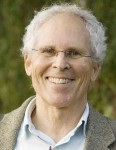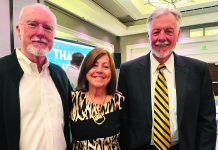Climate-Wise Laguna

With an appreciative nod to the ongoing Laguna water-wise campaign, a group of townspeople came together last summer to propose and advocate for steps to address climate change. We call ourselves Climate-Wise Laguna and have about a dozen members: retired and active professors, lawyers, a hydrological engineer, a wealth management consultant, a member of the city’s Environmental Sustainability Committee, and an oceanographer-climate scientist doing cutting-edge research.
Representing our group, I spoke at the Laguna Beach Rotary Club recently. On that occasion I presented a list of 15 climate-wise actions that can be taken immediately by all of us to address global warming. One of our members, Debby Steel, edited and had the list printed on cards that I distributed at the meeting.
A few examples of the actions follow. Use LED light bulbs; they use 80% less energy than other bulbs. Eat less meat because carbon-absorbing rain forests are being cut down to provide pasture-land to grow beef, and the methane expelled by grazing cows is far more heat-generating than carbon dioxide. Buy less stuff; making and distributing products creates carbon emissions. Keep your car longer, and consider buying an electric or hybrid when it’s time to replace. Encourage candidates and elected officials to prioritize climate action.
Though these actions seemed like common sense steps to our group, we were not sure how others might regard them. The 40 Rotarians I spoke to seemed in agreement with all of them; at least no one disagreed with any of the actions, or with the seriousness of the problem I was addressing. I found this heartening.
Our group plans to present our 15 actions at an upcoming City Council meeting during public comments. I’ll keep readers posted on when this will happen.
Climate-Wise Laguna meanwhile will continue working on drafts of advisory recommendations for City Council. These recommendations will be aimed at updating and improving the implementation of our city’s Climate Protection Action Plan. That dated plan was approved in 2009 and much new information is available now. For instance, two of our members are preparing a revenue-neutral carbon fee and dividend recommendation with the hope that Council will endorse it and urge Congress to act on it. Another member is working on transforming food waste into energy. I’m preparing a recommendation on city installation of solar panels on the rooftops of publicly-owned facilities. Members of our group are researching and writing drafts of recommendations for forming or joining clean energy cooperatives—called consumer choice aggregation/or energy. My wife, Ginger, is hard at work on that while a number of other cities are paving the way on that game-changing climate policy. Recently, for example, Whittier joined some 27 other Los Angeles County cities in setting up a CCA; numerous cities in San Diego County are in the process of doing likewise. So other California cities have already done many of these things and our group is trying to learn from the experiences of those municipalities.
A key takeaway from what has just been said is that cities and states must take on the challenge of climate change. Because the likelihood of the current administration in Washington, D.C. embarking on meaningful action on this existential peril seems remote or virtually non-existent, it’s up to cities and states to devise and implement the needed policies to prevent planetary warming from blighting the prospects of future generations. The three deadly and destructive bomb cyclones that hit Massachusetts’ coast–with 15-20 foot storm waves crashing over seawalls into neighborhoods–within a two-week period earlier this year are alarming. They augur the extreme weather and coastal flooding that will become more common as the polar ice sheets continue melting and oceans warm. Newport Beach is spending more than a $1 million raising seawalls. While this may be necessary, our group wants to focus primarily on preventing the rise in air and sea temperatures in the first place. Doing that is climate-wise.
Tom Osborne’s latest book is “Peter Douglas and the Fight to Save California’s Shore” (University of California Press, 2017).




